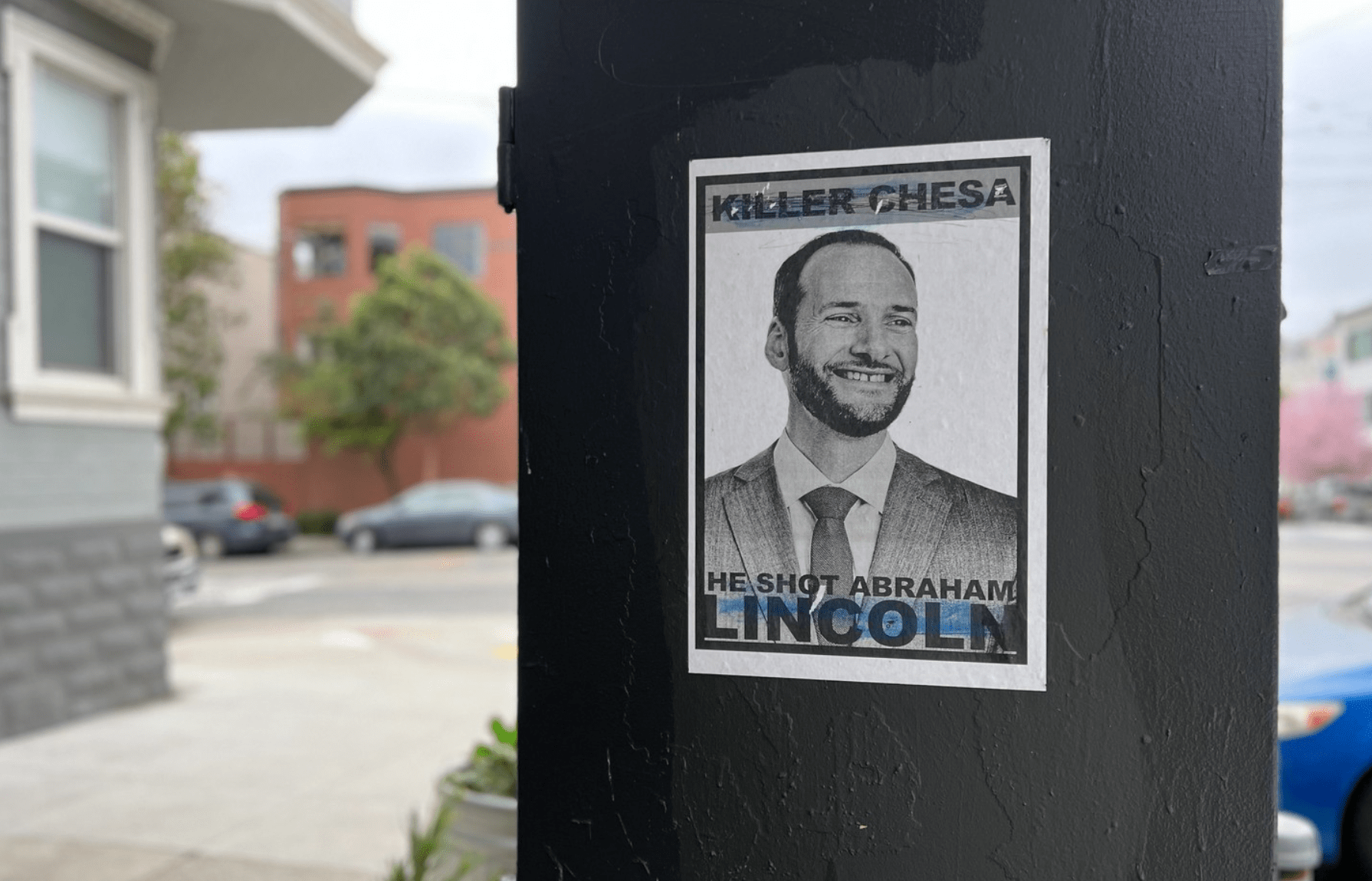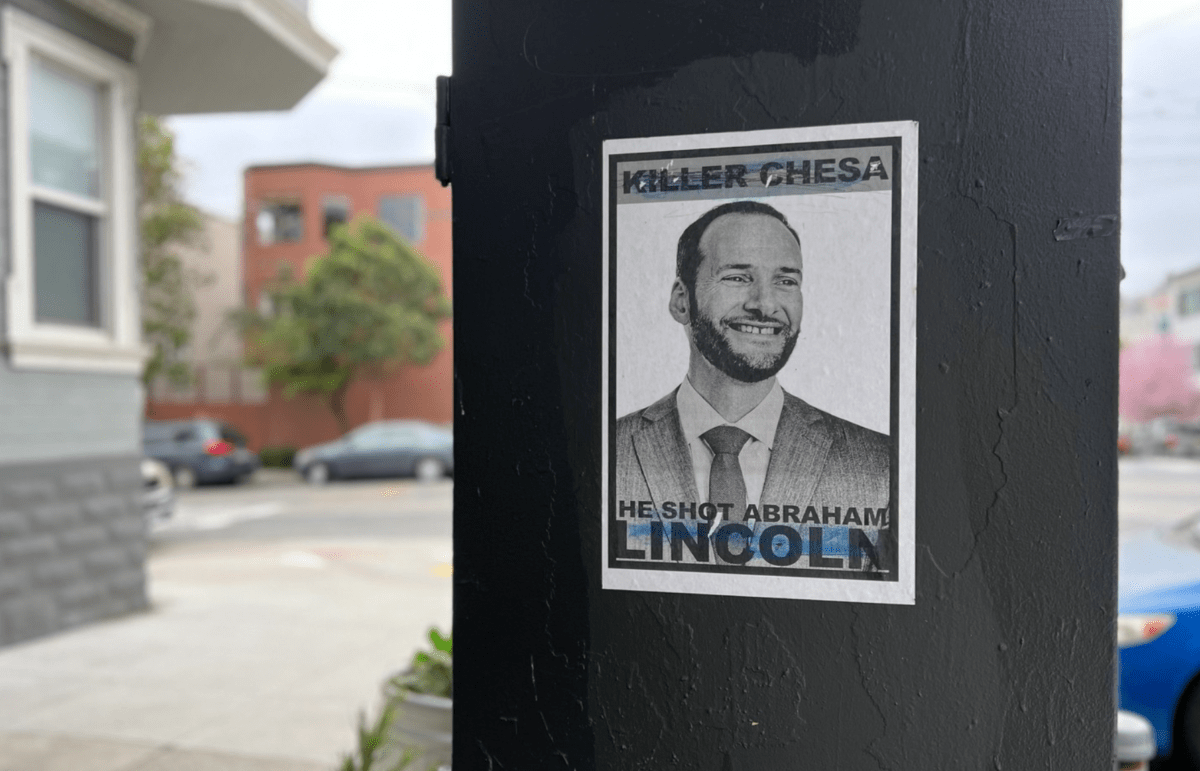Newsletter
The Chesa Boudin Recall Was a Fight to Protect the Status Quo
For the wealthy backers of the Boudin recall, “progressive” prosecutors are the perfect scapegoat for what they see as threats to a system that treats them just fine.


The Chesa Boudin Recall Was a Fight to Protect the Status Quo
by Jerry Iannelli
On Tuesday, Chesa Boudin, the self-styled “progressive prosecutor” in charge of the San Francisco District Attorney’s Office, lost handily in a recall election bankrolled by local and national conservatives. The outcome was not particularly surprising, as polls showed that Boudin had been underwater ahead of the vote.
In the wake of Tuesday’s results, it seems inevitable that some will falsely claim this race was a referendum on the entire movement to reform the criminal legal system, rather than one high-profile defeat that is unfairly overshadowing scores of smaller victories in other parts of the country. But the reasons Boudin found himself in this predicament at all are important nonetheless.
Elected in 2019 on a promise to radically transform the city’s legal system, Boudin quickly became the target of a years-long smear campaign and bitter recall fight, driven by a burgeoning alliance between the local press, police unions, major conservative outlets like Fox News, and the city’s allegedly “progressive” class of wealthy tech investors.
For the wealthy backers of Boudin’s recall, “progressive” prosecutors are the perfect scapegoat for what they see as emergent threats. While Boudin and his counterparts in other jurisdictions have in some ways promised to transform society, it has become clear that they have limited power to do this alone.
Whatever policies progressive prosecutors may implement to make the legal system less unjust, the people who are most over-criminalized and policed still suffer disproportionately from a lack of housing, health care, clean air, transportation, and good jobs. And in the end, we cannot provide these things in earnest without substantially raising taxes on the wealthy or otherwise fundamentally changing the way society works. Although decarcerating America is certainly a worthy objective, simply not arresting the largely low-income and Black and brown people who populate America’s prisons is not enough.
But the status quo has created a pretty solid quality of life for, say, realtors who dumped money into the Boudin recall campaign. Many of the people who donated to the recall effort rely on heavy-handed cops to make their businesses work. Police are often agents of gentrification, and many of the city’s realtors seem fine with empowering law enforcement to displace and disappear homeless people if it means they can sell a few more warehouse lofts. Having to see poverty on your way to a Hawaiian barbeque beer hall kind of dampens the mood, after all.
Other major funders of Boudin’s recall included big players in Silicon Valley, like David O. Sacks, the founding COO of PayPal, who also invested in Facebook, Uber, SpaceX, Airbnb, and other major tech companies. Whether they realize it or not, these donors benefit financially when the poor are warehoused in prisons and jails, stigmatized as felons, or shot dead in the street, because those options are all far cheaper for the wealthy than actually funding social services.
Few people underscore this point better than William Oberndorf, the single largest donor to the “Neighbors for a Better San Francisco” political action committee, the biggest group pushing the Boudin recall. Obendorf is a “Never Trump” Republican who’s donated millions to GOP politicians, including Mitch McConnell, Mitt Romney, and Jeb Bush. The fact that Oberndorf does not, for example, pay a massive marginal tax rate to fund housing for the homeless allows him to instead spend huge amounts of his income influencing politics and gambling on tech investments, all in an effort to preserve and amass more wealth.
It’s telling that wealthy San Franciscans have had a prolonged meltdown over Boudin’s tenure, even though his most ambitious policies have not been particularly transformational. Despite his rhetoric, Boudin’s office mostly fiddled with policies at the margins. And while his office might argue that he was forced to take a more constrained approach, Boudin ultimately shrunk drug-related convictions by a decidedly-not-transformational amount and even angered public defenders by requesting $2.3 million to ramp up fentanyl prosecutions. (Ironically, law enforcement and business groups later criticized the program for not prosecuting more fentanyl cases).
Likewise, a recent San Francisco Chronicle piece outlined how Boudin’s office actually failed to pump resources into preexisting restorative justice programs that could have reduced recidivism among arrested children. By underdelivering, it seems Boudin may have failed to mobilize his own base enough to combat a very predictable right-wing backlash.
But even with those failures in mind, Boudin’s stated ideology hinted at a world in which the indigent actually deserve some rights. His office, for example, stopped assigning cash bail for certain charges and the city did not burn down. What would stop Boudin or his successor from chipping away at the system even further?
The wealthiest San Franciscans simply could not allow this. So with a gigantic war chest, Boudin’s opponents mounted a transparently bad faith campaign to pretend the city was on fire, even though it was not. Conservative outlets like Fox News and Breitbart turned Boudin into a household name, reportedly mentioning his name more than 1,400 times in the last year.
Right-wing media, desperate to portray California as a failed state run by woke hippies, dubiously claimed that Boudin had done everything from releasing “an army of drug dealers” from prison to causing a spike in fentanyl overdoses in Humboldt County, more than 300 miles north of San Francisco. Other, less bombastic writers at the Wall Street Journal and Atlantic Monthly took plenty of bad faith pot-shots as well. So did the Chronicle—the local paper of record—with one particular columnist writing dozens of negative stories, including some that misleadingly bolstered the “progressive” credentials of Boudin’s opponents.
Local cops also went on something of their own wildcat strike, prompting reports that they had let crimes occur and discouraged victims from reporting incidents in order to create more bad headlines for the DA’s office. Last month, Boudin’s office told the San Francisco news site Mission Local that prosecutors had to rent their own U-Haul for an operation to break up an alleged theft ring after the SFPD claimed it was “too busy” to participate.
Local TV news was also complicit in smearing Boudin. Outlets allowed major retail chains like Walgreens or Safeway to wantonly lie so they could blame Boudin for a citywide spike in shoplifting that did not exist. Even random purse snatchings turned into headline news that could be used to point the finger at the DA’s office. In a particularly high-profile incident, KGO-TV, the Bay Area’s local ABC affiliate, ran a dead-wrong story blaming Boudin for dropping charges against a 16-year-old girl accused of carjacking a 75-year-old woman. The piece was completely inaccurate, but that did not stop right-wing pundits from picking up the story online.
Even self-professed “moderate liberals” and “progressives” joined in on the dog-pile. At the height of the crime panic last Fall, luxury stores in San Francisco’s downtown boarded up their windows—leading to screeds from centrist Democrats lamenting that their city was on the brink of anarchy because they could not see inside a Burberry store. Of course, this was little more than status anxiety: The city’s rich liberals benefit from the police just as much as its rich conservatives do.
In the lead-up to Boudin’s recall, some journalists sought to point out that the data overwhelmingly did not support claims of a crime spike in San Francisco. Despite these facts, in polls, many of the city’s residents said they no longer “felt” safe. Some on the left have frustratedly explained this as yet another case of mass delusion. But perhaps people could be excused for feeling some lack of safety right now—albeit for reasons that go far beyond the actions of any individual prosecutor.
Since March 2020, amid a failed national response to the pandemic, more than 1 million people have died, the economy has crashed, and Americans have learned—whether they’re willing to accept it or not—that we’re all one, particularly nasty germ away from potential societal collapse. Meanwhile, we’ve gotten no relief from a staggering list of other problems—poverty, inequality, a complete lack of affordable housing, unattainable health care, endless student loan debt, and mass shootings, to name a few. Americans are desperate for real, meaningful action on those issues, but the federal government has offered little more than a thumbs-up in response. No sane person would feel safe in such a country. But that’s hardly Chesa Boudin’s fault.
We could, of course, begin addressing these issues by breaking the stranglehold the uber-wealthy have over our public sphere. But, rather than allow those thoughts to enter the public consciousness, the media has helped make a progressive DA the scapegoat for America’s slow decline. And so, Boudin lost. Behind his defeat we see a new playbook for protecting an inequitable status quo that makes us all less safe. As long as the rest of us feel unsafe, the wealthy get to rest easy at night.
In the news
Contact us at newsletter@theappeal.org so we can feature your work here.
The Queens District Attorney dropped charges against Prakash Churaman, who was accused of murder when he was 15-years-old. Churaman spent years locked up for a crime he says he did not commit. [Max Rivlin-Nadler / Hell Gate]
Scalawag is launching “pop justice,” a series that will “examine the way pop culture—music, film, television, TikTok, journalism—warps our understanding of policing and justice and ultimately stalls overdue calls for abolition.” [Ko Bragg / Scalawag]
In the wake of two high-profile cases of California women facing aggressive prosecution after losing pregnancies, state lawmakers are moving to restrict law enforcement from investigating people who suffer stillbirths or miscarriages. [Jessica Pishko / Bolts]
When abortion was illegal in California, Senator Dianne Feinstein served on the San Francisco Board of Supervisors. As part of her role, she determined prison sentences for abortion providers. “I really came to believe that the law is the law,” Feinstein told The Cut. [Rebecca Traister / The Cut]
Chicago Mayor Lori Lightfoot said that people charged with certain violent crimes should remain imprisoned because they are “guilty,” even though they have not yet been found guilty of any crime. [Gregory Pratt / Twitter]
ICYMI—From The Appeal
Elizabeth Weill-Greenberg reports on the case of Danyel Smith, who was sentenced to life in prison in 2003 for the death of his son, in what prosecutors alleged was an open-and-shut case of “shaken baby syndrome.” Nearly 20 years later, a leading medical expert says the evidence shows no abuse took place. [The Appeal]
A new policy in New York severely restricts personal care packages sent to prisons, instead forcing people to buy them through vendors. Advocates tell Molly Hagan this will exacerbate inequities in prison and make it even harder for the incarcerated to get fresh food. [The Appeal]
That’s all for this week. Feel free to leave us some feedback, and if you want to support our relaunch, please donate here.
